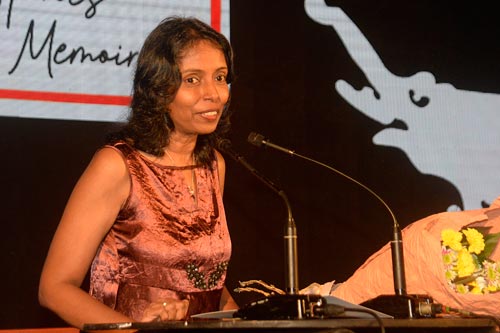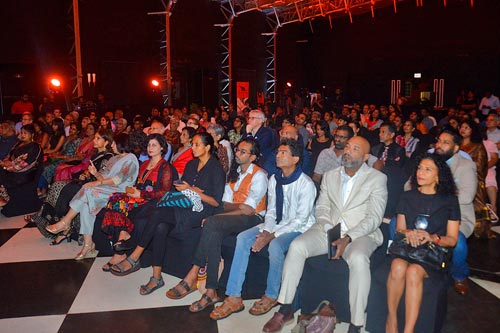Sitting down and getting on with your writing; most important ritual for any writer
While books have been the pivot of Ramya Chamalie Jirasinghe’s existence, her poems are a testimony to other elements constituting her life whether it’s ‘The Moon at Seenukgala’ (a nature poem set in wild Udawalawe), or ‘My Parents’ Home’ (partly celebrating a halcyon childhood).
Winning the Gratiaen Prize this year Ramya says was ‘humbling’, but as Dr. Anthony Joseph, Chair of this year’s jury, predicted, this win will only be the beginning of a journey for Ramya and also her evocative novel…

'I've been writing for a long time': Ramya at the Gratiaen event. Pic by Eshan Fernando
Still a bit dazed by the win, Ramya says, “I’m moved by the love I’m getting and by the warm wishes that I have got since I got this award. I’ve never been in a situation where I have won something like this before (and) I have been writing for a long time.
“This is my first, and I didn’t realize how much genuine support there has been for my work…”
Like Father Cabraal’s Recipe for Love Cake, her winning novel, unabashedly celebrates food including the titular bolo di amore and the mystique of a tropical island and an old, colonial fort, her poems too, are delicious and crisp.
We sit down to chat and reminisce in Ramya’s house in Nawala while outside in the wild garden creatures stir and inside, books overflow from cupboards and shelves.
Even in Ramya’s most thought-provoking and ‘political’ poems there are sensory celebrations. Take The Breadmaker’s Time which casts a glance at an affluent kitchen and its humble cook:
“Sandy yeast granules, / feeding on sweetness, / discover life through water/ warmed by the day’s heat …
“Frothing liquid yeast, wheaten powder, are/ rolled into dough: / a live flesh that grows pliant, satiated…
“Her hourglass listens to the sound of/ a human working, / the body, breathing, softly breathless, offering itself to its/ crafting hands. / The sand stops flowing. / This is the breadmaker’s time…
It was two teachers at Musaeus College, Colombo who coaxed out the writer in Ramya – an English literature teacher and a Sinhala teacher. Later, after graduating from the School of Oriental and African Studies (SOAS), London, she sent in a poem to an English Writers’ Cooperative competition and won the first place.
EWC founder, the poet Anne Ranasinghe would then call her. “She said, ‘I would like to get to know you’.” Anne would take Ramya under her wing and mentor her. “She was the one who really got me writing,” says Ramya.
Other beacon-like figures in her journey have been Tissa Abeysekara, Ranjini (Ellepola) Obeysekere, Lakshmi de Silva and Vijita Fernando.
For a poet addicted to short bursts of lyrical inspiration, a full-length novel is a hard commitment, and it was thanks to being stuck at home during COVID that Ramya could spend four hours a day writing. “Sitting down and getting on with your writing,” says Ramya “is the most important ritual for any writer.”
Ramya was previously shortlisted for the Gratiaen in 1998 and 2007, and was a judge for the 2018 prize.
Soft-spoken and modest, and often favouring the saree (though the Gratiaen night was an exception) Ramya today works for Kindernothilfe, a German development cooperation partner organization. She was earlier Deputy Director of the US-Sri Lanka Fulbright Commission.
Amidst her published works is There’s an Island in the Bone, a poetry collection that was as much an artisanal work of art as a treasury of verses to be carried around and dipped into. She also wrote a book on the Tsunami, titled Rhythm of the Sea, and a history of Trinity College, Kandy.
Her other published collection, Love Poems from a Frangipani Garden was called “a ‘courageous protest’… on the divisive social issues facing us as a people still searching for identity, speaking too for those who have no voice”.

Audience at the event
When Life touches Life, a biography, was the story of educator and legendary principal of Trinity College, Leonard de Alwis.
Amidst the accolades Ramya has garnered as poet and author are: being joint runner-up to the UK Guardian Orange First Words Prize of 2009, The Times of UK online featuring her poem ‘Lagoon Lotus’, (first published in this newspaper) in its 2009 selection of contemporary war poetry, and being longlisted for the Fish Poetry Prize, Ireland.
She has also won the Youth Poetry Award of the National Youth Council of Sri Lanka in 1992, the English Writers Cooperative’s Poetry Competition in 1997 and has had her work in The Tipton Poetry Journal, Channels, Nethra, Osprey, and also in Kaleidoscope 2: An Anthology of Sri Lankan English Literature edited by D.C.R. A. Goonetilleke.
The next step for Ramya is to get the book published, breaking into the publishing industry in the UK being ‘very tough’.
Ramya, who loves helping young writers, has conducted a number of workshops, including one at the American Center called Writers’ Lab with Ameena Hussein, some on behalf of the English Writers’ Cooperative, and for Fairway.
Says Ramya, “Whenever a school invites me I am willing to help – always ready to help young writers.”
Searching for an ideal partner? Find your soul mate on Hitad.lk, Sri Lanka's favourite marriage proposals page. With Hitad.lk matrimonial advertisements you have access to thousands of ads from potential suitors who are looking for someone just like you.


